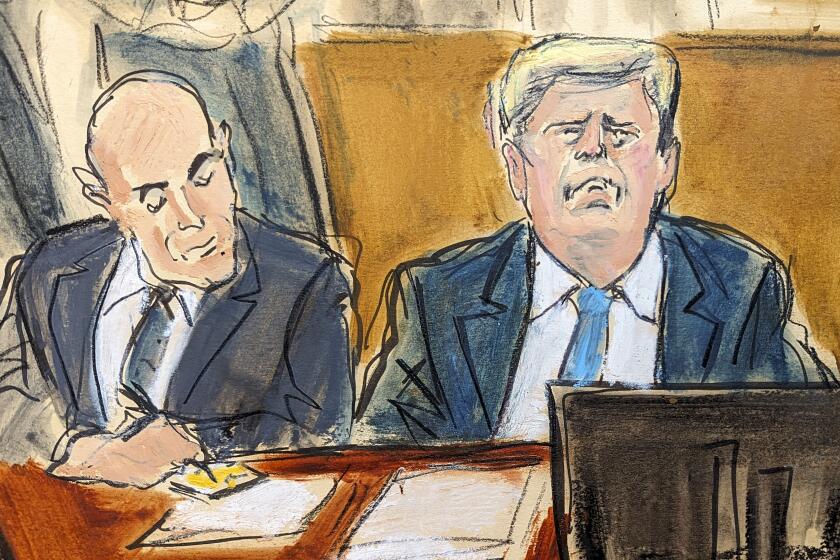Killer’s Execution Would Be Suicide, Lawyer Says
If confessed murderer Dan Patrick Hauser is executed as scheduled today, is the state an accomplice to suicide?
His attorney says yes.
“Mr. Hauser’s death sentence is based entirely and exclusively on information that is provided by Mr. Hauser that is false,” Tim Schardl argued in an appeal that was dismissed earlier this month by the Florida Supreme Court.
“What is unprecedented here,” Schardl said Monday, “is that I don’t think we’ve ever had in Florida a case where someone has been allowed to plead guilty to death. But that is what’s happening.”
The 29-year-old Hauser, a California-born drifter, confessed to strangling a woman in Fort Walton Beach, Fla., to satisfy an urge to kill. He is to be put to death by lethal injection this evening at Florida State Prison in Starke. He has said he wants to die and has implored lawyers not to seek a stay.
But attorneys acting on behalf of his birth mother, Zainna Crawford, have appealed anyway--citing Hauser’s grisly confession to the 1995 murder as evidence that he is not mentally competent to be executed. The U.S. Supreme Court has found that executing the mentally ill is a violation of the constitutional ban on cruel and unusual punishment.
Jeb Bush Could Order Psychiatric Evaluation
Schardl, an attorney for the state-funded Capital Collateral Counsel, on Monday asked the U.S. District Court in Tallahassee to intervene. Gov. Jeb Bush, a firm supporter of the death penalty, also could order that Hauser undergo a psychiatric evaluation.
Bush says that he will read the Supreme Court decision. “We’re not going to execute people unless all the facts are out there and people have concluded that it is the right thing to do,” he said.
Hauser was arrested weeks after the New Year’s Day murder of 21-year-old Melanie Rodrigues, who worked in both a convenience store and a topless bar.
He pleaded guilty to the slaying and, just before sentencing, wrote a detailed description of how he had tortured Rodrigues--choking her until she passed out and then reviving her to choke her again. “I wanted to watch the fear in her eyes,” he wrote.
But Schardl said a review of the case reveals that Hauser’s account of what he did is inconsistent with the physical evidence, and little resembles the story he told police who arrested him in Reno, Nev.
Was Allowed to Lie About Hospitalization
Hauser also was permitted to tell the court that he had never been treated for mental illness, when in fact he has been hospitalized for the disease, Schardl said.
“The principal concern here is for the victim’s family, which has been led to believe Ms. Rodrigues died slowly and in great fear,” Schardl added. “His statement was motivated by his desire to be executed, and that desire is driven by mental illness.”
Hauser may be guilty of murder, his lawyer says, but not premeditated, first-degree murder.
Bruce Winnick, a University of Miami law professor who has followed the case, said that although Hauser showed “some evidence of potential incompetence, that does not decide the issue. But it does send up a red flag and suggests that before we kill him, we might have a clinician examine him.”
If executed, Hauser would be the fifth inmate to die since Florida unplugged Old Sparky, the electric chair, and switched over to poison.
* Times researcher Edith Stanley contributed to this story.
More to Read
Start your day right
Sign up for Essential California for news, features and recommendations from the L.A. Times and beyond in your inbox six days a week.
You may occasionally receive promotional content from the Los Angeles Times.






